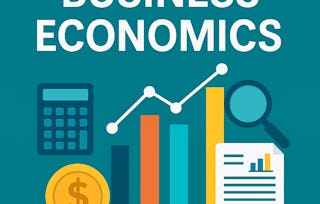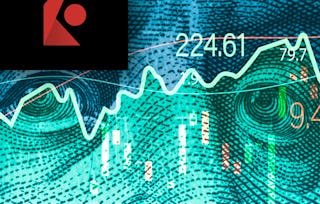Economics and economic theory is fundamental to decision making in business, policy, and everyday life. If you're interested in a career in business, law, accounting, or investment then studying economics is a great foundation of knowledge.

Principles of Economics: Introduction - Getting to Know You
Ends soon: Gain next-level skills with Coursera Plus for $199 (regularly $399). Save now.

Principles of Economics: Introduction - Getting to Know You
This course is part of A Story of Economics: A Principles Tale Specialization

Instructor: James DeNicco
9,140 already enrolled
Included with
(62 reviews)
Recommended experience
Skills you'll gain
Details to know

Add to your LinkedIn profile
55 assignments
See how employees at top companies are mastering in-demand skills

Build your subject-matter expertise
- Learn new concepts from industry experts
- Gain a foundational understanding of a subject or tool
- Develop job-relevant skills with hands-on projects
- Earn a shareable career certificate

There are 7 modules in this course
Congratulations on enrolling and welcome! Please take a look around at these intro and orientation materials. Here you'll learn a little bit about the course, what you'll gain, and also a little bit about yours truly.
What's included
3 videos4 readings1 discussion prompt
It's always a good idea to start a story that's beginning. We're going to begin at the beginning of the story of economics. What is economics? That's a good question. Well, the standard definition is the study of choice in a world of scarcity. Now I can't argue with that, but let's take a deeper dive in this Module explore more of what it's really all about.
What's included
10 videos1 reading10 assignments1 discussion prompt
What are markets? Well, a market is just anytime there's a group of buyers and sellers. So the buyers, they're going to constitute demand. Buyers make up the demand for a good or service, sellers, they make up the supply of a good or service. There's all kinds of markets out there and we're going to take a look at them and more in this module.
What's included
12 videos11 assignments1 discussion prompt
Welcome to elasticity. Now with elasticity, we want to talk about how sensitive supply and demand are. Elasticity is a measure of responsiveness of the quantity demanded or quantity supplied when there's a change in one of their determinants. The things that make up supply and demand when they change, how much does the quantity demanded or the quantity supplied change. Now let's take a look at the ins and outs of elasticity.
What's included
9 videos9 assignments1 discussion prompt
In this module, we're going to talk about how government policy interacts with our markets. How government policy interacts with supply and demand. We're going to look at two main types of government policy. We're going to look at price setting and we're going to look at taxes. Let's get to it!
What's included
7 videos7 assignments1 discussion prompt
Welcome to welfare economics. Where here, we're going to look at how well our markets are fairing. Now, I know we don't like to be judgmental, but here we're going to judge, we're going to judge the performance of our markets. In welfare economics, the goal is to get everybody in the market who values the product above or equal to the cost of making it. C'mon, let's get it.
What's included
9 videos8 assignments1 discussion prompt
Oh my gosh, it's the final module of this course! What a journey thus far, but there's still much to cover! Up until this point, we've been assuming that we're in a perfectly competitive market with no externalities. Well, we're going to continue to assume that we're in a perfectly competitive market, even though that might be a little bit more of a theoretical boundary. But here, we're going to relax the assumption about externalities. So no longer are we going to assume that our actions don't affect bystanders. What this is going to give us an ability to do is talk about the potential role of government. So, what is an externality? Let's take a look.
What's included
10 videos10 assignments1 discussion prompt
Earn a career certificate
Add this credential to your LinkedIn profile, resume, or CV. Share it on social media and in your performance review.
Instructor

Offered by
Explore more from Economics
 Status: Free Trial
Status: Free TrialRice University
 Status: Free Trial
Status: Free TrialRice University
 Status: Preview
Status: PreviewO.P. Jindal Global University
 Status: Free Trial
Status: Free TrialInteractive Brokers
Why people choose Coursera for their career




Learner reviews
62 reviews
- 5 stars
91.93%
- 4 stars
6.45%
- 3 stars
0%
- 2 stars
0%
- 1 star
1.61%
Showing 3 of 62
Reviewed on Aug 2, 2024
The styly of the tutor's teaching is very relaxed and fun. Meanwile the course itself is informative and accessible for beginners. Highly recommend to anyone who has a general interest in economics.
Reviewed on Dec 6, 2025
Terrific Economics course, I’m looking forward to taking the next two courses in this program.
Reviewed on Jun 29, 2024
Jimmy provides a fun method of teaching and makes a complex subject accessable.
Frequently asked questions
To access the course materials, assignments and to earn a Certificate, you will need to purchase the Certificate experience when you enroll in a course. You can try a Free Trial instead, or apply for Financial Aid. The course may offer 'Full Course, No Certificate' instead. This option lets you see all course materials, submit required assessments, and get a final grade. This also means that you will not be able to purchase a Certificate experience.
When you enroll in the course, you get access to all of the courses in the Specialization, and you earn a certificate when you complete the work. Your electronic Certificate will be added to your Accomplishments page - from there, you can print your Certificate or add it to your LinkedIn profile.
Yes. In select learning programs, you can apply for financial aid or a scholarship if you can’t afford the enrollment fee. If fin aid or scholarship is available for your learning program selection, you’ll find a link to apply on the description page.
More questions
Financial aid available,





